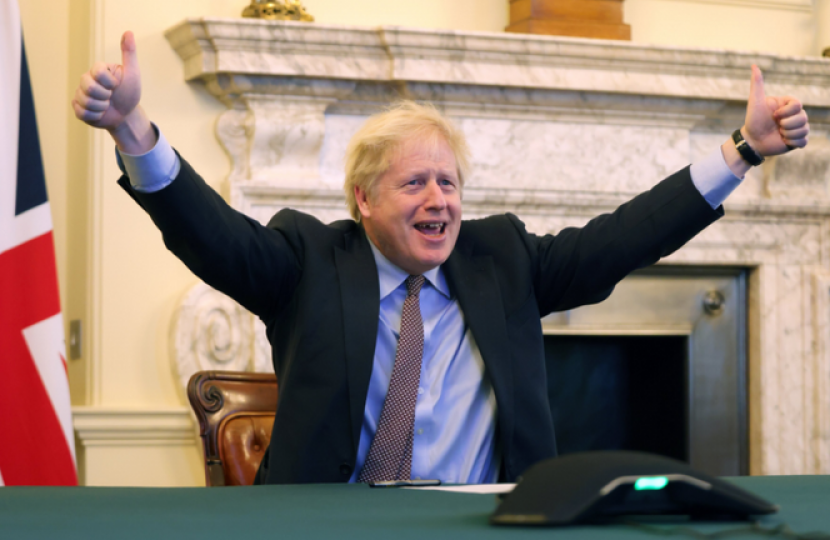
Both Houses of Parliament have approved the trade deal that Boris Johnson’s Conservative Government has secured for the United Kingdom, which fully delivers on what the British people voted for both in the referendum and the last election.
It has been a long road for me. I remember that for me it all began at a fringe meeting at the Conservative Party Conference back when John Major was Prime Minister. I can’t recall what the fringe meeting was about, but I do recall that the gent sat next to me got up to leave about halfway through. After he had gone I saw he had left a paperback book on his seat. It was too late to call after him, so I picked up the book.
It was the consolidated text of the Maastricht Treaty – then causing all sorts of ructions in the Conservative Party. I thought I would read it to see what all the fuss was about. So I did – and was converted to Euroscepticism. Back then I was what would later be termed a “remain-and-reform” Eurosceptic. I did not become a Brexiteer until the farrago over the Lisbon Treaty in 2009 convince me that the EU could not be reformed. The UK either had to become part of a centralised, undemocratic superstate or leave.
And now we have left.
As Boris promised, this deal takes back control of our laws, borders, money, trade and fisheries – and it ends any role for the European Court. From 1st January 2021, the United Kingdom will have political and economic independence – and we will thrive as a country now fully outside the European Union.
We will enter the New Year as a fully sovereign nation. 2021 will be our opportunity to show what Global Britain means to the rest of the world: striking trade deals with new markets, reasserting ourselves as a liberal and free trading nation; and acting as a force for good in the world.
This agreement:
- Is based on international law, not EU law. There is no role for the European Court of Justice and no requirements for the UK to continue to follow EU law. All of our key red lines about returning sovereignty have been achieved. We will have full political and economic independence on 1st January 2021 and our laws will be determined by our own elected politicians.
- It is the first free trade agreement based on zero tariffs and zero quotas that the EU has ever agreed. This will be fantastic news for families and businesses in every part of the UK. Businesses will be able to continue to trade smoothly and people will be able to continue to buy goods from Europe tariff-free. From financial services through to automotive manufacturing, the deal protects high quality jobs and investment right across the UK. And people will be able to continue to buy goods from Europe tariff-free, protecting consumer prices.
- Secures on the pledge to protect and boost our economy and provides for continued market access across a broad scope of key service sectors, including professional and business services. This market access will support new and continued investment between businesses. It also means that business travellers will be able to easily move between the EU and the UK for short term visits and the agreement on financial services ensures financial stability and consumer protection.
- Recognises UK sovereignty over our fishing waters and puts us in a position to rebuild our fishing fleet and increase quotas, overturning the inequity that British fishermen have faced for over four decades. By the end of the five-and-a-half-year transition period, we will have full control of our waters and the amount of fish available to UK fishermen will have risen from half to two-thirds.
- Delivers on the commitment to maintaining high labour, environment and climate standards without giving the EU any say over our rules. The UK’s high standards have never been dependent on EU membership. For example, our living wage and entitlements to sick pay, parental leave and annual leave already go way beyond what the EU requires.
- Allows the UK to introduce our own subsidy system so that we can better support businesses to grow and thrive. This new subsidy regime will operate in a way that best suits the interests of UK industries - fundamentally different from EU State Aid.
- Supports the objective of prioritising the safety and security of the UK’s citizens. It offers streamlined co-operation on law enforcement, ensuring we continue to effectively tackle serious organised crime and counter terrorism, protecting the public, and bringing criminals to justice. It also provides for future cooperation between the UK and EU on emerging security challenges, such as cyber and health security, including continuing to work together on tackling the spread of Covid-19.
- Provides for the UK’s participation in certain EU programmes where they are in our interest and fulfilling our commitment to making the UK a science and research superpower. We will continue to participate in the science and research programmes, Horizon Europe, Euratom Research and Training programme, and the space programme, Copernicus.
- Delivers for UK citizens, making our daily lives easier. It includes arrangements for airlines and hauliers that provides them with certainty, and gives people the ability to travel to and from the EU easily for work and holidays; a social security agreement that has practical benefits for UK citizens including accessing healthcare when travelling in the EU; and agreements on energy which will benefit consumers by helping to keep prices down.
- Finally, the deal delivers for the entire UK, protecting the integrity of our internal market and Northern Ireland’s place within it. Northern Ireland businesses will have unfettered access to the rest of the UK market under all circumstances; there are no tariffs on goods remaining within the UK customs territory; the deal enables smooth flow of trade with no need for new physical customs infrastructure; and there is no legal confusion about the fact that, while Northern Ireland will remain subject to the EU’s State Aid regime for the duration of the Protocol, Great Britain will not be subject to EU rules in this area.
Of course, I could quibble over details. The deal on fish is less than perfect, and clearly we are going to have to become self-sufficient in energy to escape the EU’s stranglehold there, and some of the provisions allowing for pre-emptive strikes on retaliatory tariffs sound a bit iffy to me.
But I quibble. If in 2009 when I had become a Brexiteer I had been offered this deal, I would have grabbed it with both hands. The UK is again a free, democratic and sovereign nation state as it was when I was born. For that, I am thankful.

